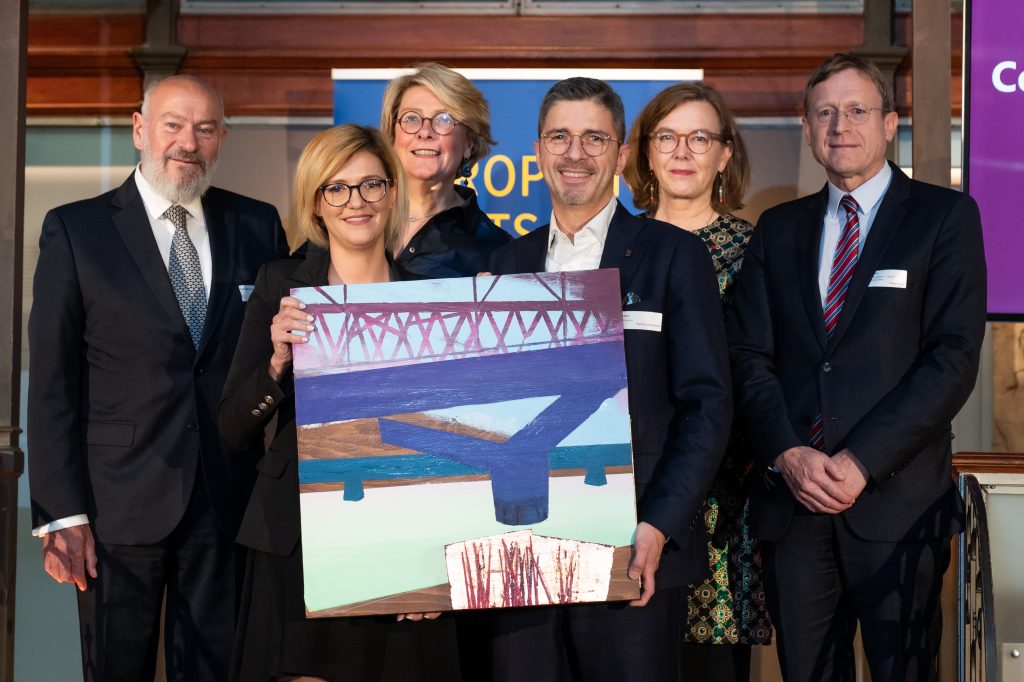Seaports will play an equally important role in the production, supply and storage of clean energies


By : Marek Grzybowski
Marek Grzybowski (eBlue Economy office manager in Europe ) in an exclusive interview with 3 questions to Isabelle Ryckbost, Secretary General of the European Sea Ports Organisation (ESPO)
Isabelle Ryckbost reveals that the Ports are heavy assets: new infrastructure has long lead times because of planning, permitting and financing issues.
She added The need to adapt to this very short term changes is the biggest challenge for Europe’s ports.
She emphasized : The positive thing is that ports can really develop as sustainable energy hubs and be an important partner in making the energy transition happen.
It is noteworthy : ESPO represents the port authorities, port associations and port administrations of the seaports of 22 Member States of the European Union and Norway at EU political level. ESPO also has observer members in Albania, Iceland, Israel, Montenegro, Ukraine and United Kingdom.
This is the text of the interview and the three questions!
ESPO established

Marek Grzybowski: How was ESPO established, who belongs to the organization? What is ESPO’s mission? What are the main activities?
Isabelle Ryckbost: The European Sea Ports Organisation was created in 1993. Many other transport organsiation were set up in these years since the Treaty of Maastricht (1992) gave Europe a lot more competences in the field of transport.
ESPO represents the port authorities, port associations and port administrations of the seaports of 22 Member States of the European Union and Norway at EU political level. ESPO also has observer members in Albania, Iceland, Israel, Montenegro, Ukraine and United Kingdom.

ESPO is the principal interface between European seaports and the European institutions and its policy makers. In this capacity we represent the interests of seaports at EU level. On top of that we are also a knowledge network gathering port experts and developing bottom up initiatives in different fields such as environment, port-city relations and cruise and ferry.
New rules of the game !

Marek Grzybowski: The port situation has changed dramatically since the Covid-19 pandemic. At the same time, shipowners, and especially line operators, impose their own rules of the game. The offshore wind offshore market is developing dynamically. How are the ports of Europe doing in this situation?
Isabelle Ryckbost: The pandemic has put the strategic and essential role of seaports on the forefront. Post have been instrumental in keeping supply chains going and ensuring that EU’s citizens and economy keeps on going. Europe’s ports remained open throughout this global crisis and showed a lot of resilience and agility through well functioning contingency plans.
It is however true that the disruptions in the supply chain are continuing and the degee of reliability of container vessel traffic has gone down drastically over the last three years. This remains very challenging for ports and negatively impacts the whole logistics chain, but especially poses challenges to European ports for handling the transport flows. Reliability, which was about 75-80% before the Covid-19 pandemic, has plummeted to 33%.

The energy transition is indeed a big game changer and also here ports are in a central position. Whereas traditionally 40% of the throughput of Europe’s ports are sources of energy, the ports will play an equally important role in the production, supply and storage of clean energies.
The Russian atack on Ukraine is pushing this development further. We are in a dynamic process both in terms of development of technologies, as in terms of market realities as in terms of policy. New targets are being set in policy, the prices are extremely volatile, which makes it very difficult to prepare, adapt, pursue a long term strategy.
Ports are heavy assets: new infrastructure has long lead times because of planning, permitting and financing issues. The need to adapt to this very short term changes is the biggest challenge for Europe’s ports. The positive thing is that ports can really develop as sustainable energy hubs and be an important partner in making the energy transition happen.
Invasion : A new challenges for Europe

Marek Grzybowski: Russia’s attack on Ukraine creates new challenges for Europe’s ports. During the Baltic Ports Conference 2022, you said that a problem for ports may be the space required for LNG, ammonia or hydrogen investments, which need much more space than conventional transshipments. How does ESPO want to solve these problems?
Isabelle Ryckbost:The Royal Haskoning DHV study that ESPO has commissioned in the beginning of this year has been assessing what the energy transition will mean in terms of port infrastructure and spatial planning. It indeed points out that the deployment of these new energies are much more demanding in terms of space, partially because of certain safety perimeters to be respected, partially because significant land area will be needed to store power. Moreover the new energy carriers in general have a lower density.
The transition to cleaner fuels combined with the need for Europe to become more independent for its energy provision are two goals of paramount importance which gain the support of Europe’s economy and society. If these goals have to be realised we need to understand that we have to invest and faciliate in making this happen.
Easier permitting for renewable energy projects, solid funding schemes are important preconditions for prots to play a role in this transition. Moreover, port citizens must see the added value of having a port nearby and understand the strategic role the port can play in supplying the surounding community with the energy it needs. This means also space and accept that new infrastructure will have to be developed.















